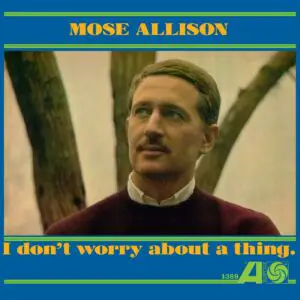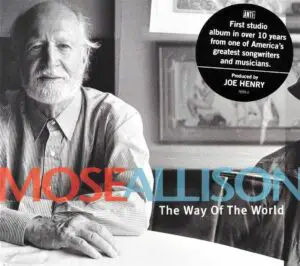If you’re a fan of blues or jazz music, then chances are you’ve heard of the legendary musician Mose Allison. Known for his smooth vocals and unique blend of blues and jazz, Allison was a true icon in the music industry. With over 50 albums released throughout his career, Mose Allison’s impact on modern music cannot be understated.

For generations of modern musicians, those that can truly be named as icons, Allison was one of the key influences, which many of them cite openly. At one point, Van Morrison said: “I heard this guy called Mose Allison…and it changed my whole approach to singing forever.” Other notable fans include John Mayall & Eric Clapton who recorded their own versions of some of his songs while Jack White paid tribute by covering two tracks off one album at once during a live performance at Third Man Records back in 2014 – further testament to how much respect he commands amongst fellow artists even after all these years.
But it wasn’t just his musical talent that made Mose Allison stand out amongst the rest. He was known for his witty and conversational tone in his songs, often incorporating clever wordplay and satirical lyrics into his music. This unique style set him apart from other musicians of his time and solidified him as a true original in the world of blues and jazz.
Songs such as “Parchman Farm”, “Your Mind Is On Vacation But Your Mouth Is Working Overtime” or “Everybody Cryin’ Mercy When Nobody Gives None” are noted by many as classics of both music and wordplay.
It All Started in Tippo, Mississippi
Allison was born in Tippo, Mississippi (1927), and he grew up surrounded by the rich sounds of blues and jazz music. This upbringing heavily influenced his musical style and ultimately led to his success in the industry. He started playing piano at age 5, and by the time he was a teenager, he was already performing at local clubs.
After serving in World War II, Allison studied English Literature at Louisiana State University (although he started out studying chemical engineering) while also pursuing his music career on the side. He did get a literature degree, but also another one in philosophy, both eventually figuring heavily in his music.
These studies helped to shape his unique writing style and provided the foundation for his clever lyrics. As an instrumentalist, Allison had a particular style of his own, both on piano and organ. He was a musician who could add the bluesy feeling he picked up in his native Mississippi with the jazz he studied while also adding his own twist.
A True Pioneer of Blending Genres
Allison’s big break came in the late 1950s when he signed with Prestige Records. He released his first album, Back Country Suite, which received critical acclaim and established him as a rising star in the music scene. From there, Allison continued to release hit albums and gained a dedicated fan base.
Describing Allison’s music in its obituary back in 2016 (Allison was 89), the British daily ‘Guardian’ wrote: “Allison always managed to sound cool and in a hurry at the same time. Needing nothing more than a piano, a microphone, and a rhythm section to fire off his own biting updates on country blues, he would hustle through his repertoire of laconic social commentary, and the classic songs of Tampa Red, Willie Dixon, and many others, as if trying to squeeze a Delta discography into a single set.”
Albums that followed, such as Local Color (1957) and Autumn Song (1959) further cemented his reputation as a true pioneer of blending genres. Still, his most prolific period was between 1960 and 1964, with “I Don’t Worry About a Thing”, (later quoted by Stevie Wonder) “Your Mind Is on Vacation” and “Don’t Forget to Smile” appearing on an impeccable series of albums for Atlantic.
The Start of the Legacy that Lives On
It’s that series of albums that seems to have had a profound influence on quite a number of rock artists with The Who’s Pete Townsend being among the first, who often played his “Young Man’s Blues” live.
While he had a prolific recording career, Allison never gave up playing live, either just with his standard rhythm section or in a larger band context with a number of renowned jazz and blues musicians, from Stan Getz to Joe Lovano and more.
But Allison’s work didn’t stop there. He continued to release albums and tours throughout the ’70s, ’80s, and ’90s, solidifying his reputation as a true legend in the music industry. At the same time, using his literature and philosophy degrees as a base, Allison also wrote several books about music theory & composition which have become standard texts used by aspiring musicians around the world today.
All those achievements resulted in Allison receiving a series of awards from the music industry and beyond. In 2013, he received a Jazz Masters award from the National Endowment for the Arts, recognizing his contributions to jazz as a living legend.
In a 1986 interview with the pianist Ben Sidran, conducted for NPR, Mr. Allison grouped his material into three categories: slapstick, social comment, and personal crisis. “Sometimes,” he added, “all three of those elements wind up in a tune.”
You sittin’ here and yakkin’ right in my face
“Your Mind Is on Vacation”
You comin’ on exactly like you own the place
You know if silence was golden
You couldn’t raise a dime
Because your mind is on vacation and your mouth is workin’ overtime
The Artist Who Never Stopped Writing
As legendary rock critic Robert Christgau noted reviewing Allison’s 2010 album The Way of The World:
“At 82, Allison has written a great song, which may seem odd given that it deals with neuron degeneration, and found an ideal producer, which is not how I usually describe Joe Henry. Ben Sidran offered him a sympathetic ear at Blue Note too, especially on 1997’s Gimcracks and Gewgaws. But Sidran is a jazz loyalist with a songwriting sideline who brought out the player in him. Henry is a singer-songwriter with a jazz Jones who conceived settings that would serve the lyrical gift that made Allison famous. ‘My Brain’ is as right for Peter Townshend in 2010 as ‘Young Man Blues’ was for Roger Daltrey in 1969.”

It was just a confirmation of an incredible musical legacy that not only had an impact in the ’60s, with followers like Townsend, and Van Morrison (who recorded a full tribute album to Allison), but also Eric Clapton, John Mayall among others in Britain, and at the time, the likes of Bobbie Gentry and Johnny Winter in Allison’s native U.S.
Yet, that influence, continued through the musical decades, with The Clash, Bonnie Raitt, Jack White, and others citing Mose Allison as one of their key influences.
It is just one confirmation that Mose Allison’s legacy lives on through his music, which continues to inspire new generations of musicians and fans alike. Mose Allison may no longer be with us, but his impact on the world of blues and jazz will always be remembered and cherished. So next time you’re listening to some smooth blues or lively jazz, remember the man behind the music – Mose Allison. His talent and wit will continue to resonate with us for years to come. As Bob Dylan once said, “If you’re not familiar with his name – shame on you!” So let’s keep the legacy of Mose Allison alive by listening to his music and sharing it with others. After all, as he once sang, “I don’t worry about a thing – because I know nothing’s gonna be alright.”




